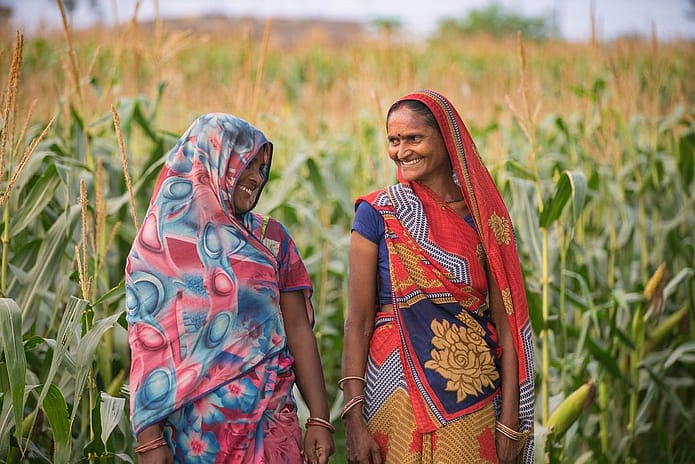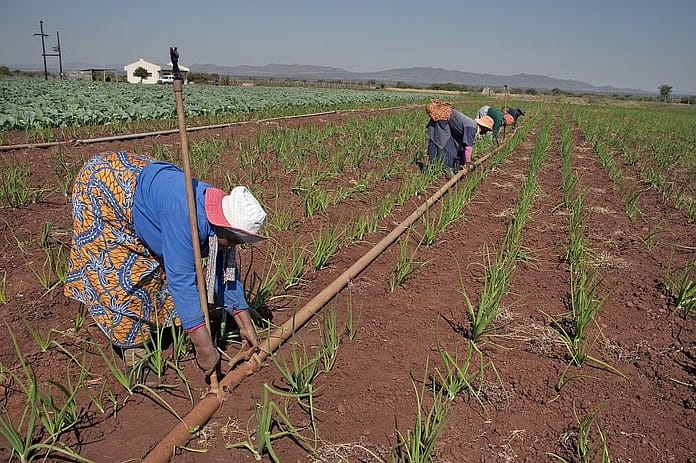Due to climate change, regions across Asia and Africa are experiencing higher frequencies of floods and drought. Coupled with rising temperatures, traditional crop-growing patterns have been altered, delayed, and disrupted. A subsequent decline in crop quality and quantity has shown macro-scale impacts on agriculture, vegetable markets, and local community wellbeing.
Droughts and floods across Asia and Africa
In August, unanticipated flooding struck Shijiazhuang, an agricultural hotspot in China, wreaking havoc on agricultural conditions and crop output. Heavy rainfall arrived nearly two months earlier than expected. In the bigger picture, 2024 has left China’s rivers more flooded than in any other year dating back to 1998. Damage from flooding caused vegetable prices to rise by nearly 40 percent, the highest level in five years. Consumers in China voiced their complaints about unprecedented prices for everyday crops such as eggplant, string bean, and cucumber; one buyer in Yan’an asked, “Who can even afford to eat?”.
Similarly, Nigerian farmers in the north faced unusual weather conditions this past summer. Floods destroyed farms and drought ruined crops en masse, causing collective food insecurity and national economic deficit. Extensive flooding washed away more than half a million hectares of farmland, while droughts deprived local communities of necessary food. Farmers told BBC reporters of the drought’s extreme effects, one farmer proclaiming that he “usually [gets] over 1000 bags of maize – this year, barely 20”.
Summer monsoon season in Sri Lanka took its toll in low-lying provinces, with a record 400 millimetres of rain that led to flooding and landslides. Although monsoons are not unusual, occurrences are now more frequent and severe. As in China and Nigeria, summer weather patterns are disrupting essential conditions for crop growth, leading to significant ripple effects in vegetable markets and broader economic implications.

Agronomic impacts
Robust crop yields are not just vital for local communities’ diets – an efficient vegetable sector is necessary to meet growing demand in domestic and export markets. Researchers found a strong link between rising temperatures and food prices, indicating climate change is increasingly affecting food production and subsequent pricing of crucial crops across the globe. In countries dependent on agricultural sectors, rising intensity of droughts and floods severely undermines food security and economic standing in the global marketplace.
As torrential rains damage crops and lower vegetable yield, bouts of vegetable scarcity and surging prices have put a strain on the rapidly growing populations in world markets. Price hikes in vegetables and other agri-products have hit average families hard and left these staples out of reach for poor households altogether.
Economically and nutritionally indispensable crops, such as beans, tomatoes, cabbage and carrots, are particularly susceptible to the interruptions caused by dry or wet periods. During a cultivation phase, heavy rains and high temperatures create an environment that is conducive to fungal or bacterial infection, inviting in pests and disease. Tomatoes and carrots also become prone to blight, while beans and cabbage tend towards rust. Farmers in Sri Lanka have reported that severe weather conditions lead to more pest and disease outbreaks, lower productivity, and overall worsen product quality, calling forth a shift to climate-smart agriculture that incorporates water management and innovative practices to address severe weather impacts.

The FRESH Initiative
In Sri Lanka, the importance of vegetable cultivation cannot be overstated – the vegetable sector, next to rice, is dominant in the agricultural space. With 70% of the rural population dependent on farming as their primary source of income, and almost half of total arable land in Sri Lanka used for agriculture, irregular rainfall patterns pose a significant threat to farmers’ livelihoods and communal wellbeing.
In light of rising severe weather conditions, the CGIAR Initiative on Fruit and Vegetables for Sustainable Healthy Diets (FRESH) aims to sustainably increase F&V intake and improve health outcomes whilst mitigating environmental impact. Research from the FRESH Initiative has identified barriers to effective crop growth and distribution, regarding input mismanagement, soil fertility, and plant health management. Researchers have developed a package of practices for enhancing safe and year-round fruit and vegetable production that can be used to bring about sustainable change.
IWMI researcher Mohamed Aheeyar visits the field with the World Vegetable Center and local partner, the Department of Agriculture, to inform farmers about ways to enhance vegetable cultivation. Using research-based methods, certain agricultural techniques can increase vegetable yield and remediate the effects of disastrous climactic variations such as flooding and drought. “Initially,” Aheeyar explains, “farmers are hesitant to stray from their conventional farming practices,” particularly when recommendations seem counterintuitive. For example, research encourages planting only two seeds per hole with the recommended spacing rather than planting multiple seeds in one hole; due to plant crowding — more seeds don’t equate to more crops.
Smarter seed planting is not the only fix FRESH uncovered. Findings indicate that simple technologies, like soil testing and fertilizer recommendations, can convert conventional cultivation practices into more sustainable farming systems. Many farmers in Sri Lanka tend to overuse fertilizer. By testing soil pH and soil nutrient content prior to cultivation, farmers can adjust soil fertility and establish ideal conditions for high fertilizer use efficiency and plant growth. There’s also an issue in pesticide application, with prevalent misuse due to a weak extension system. Targeting plant health management at its root, FRESH encourages mulching, integrated plant nutrient management and integrated pest management to promote sustainable and effective crop growth.
The project showcases the benefits of farmer participatory agricultural practices through side-by-side trial and control plots, helping farmers see firsthand how research-driven strategies enhance productivity and vegetable quality. To promote lasting change in farmers’ behaviors and attitudes amid growing impacts of floods and droughts, continuous support and guidance are crucial.

Across Asia and Africa, the rising frequency of severe weather events is negatively impacting farms and crop output. These conditions jeopardize not only domestic supplies, but also have far-reaching implications for global agricultural markets. In response to the urgent need for climate-smart agriculture, FRESH seeks to alleviate economic pressures and health-related effects of climate change by enhancing agricultural productivity and increasing fruit and vegetable yields.






